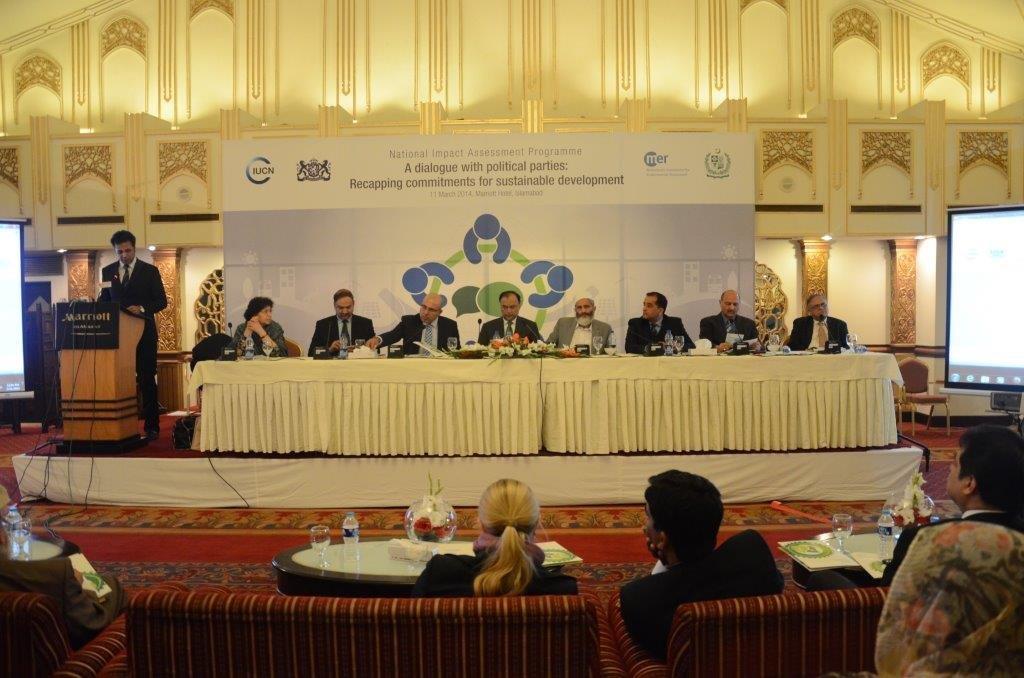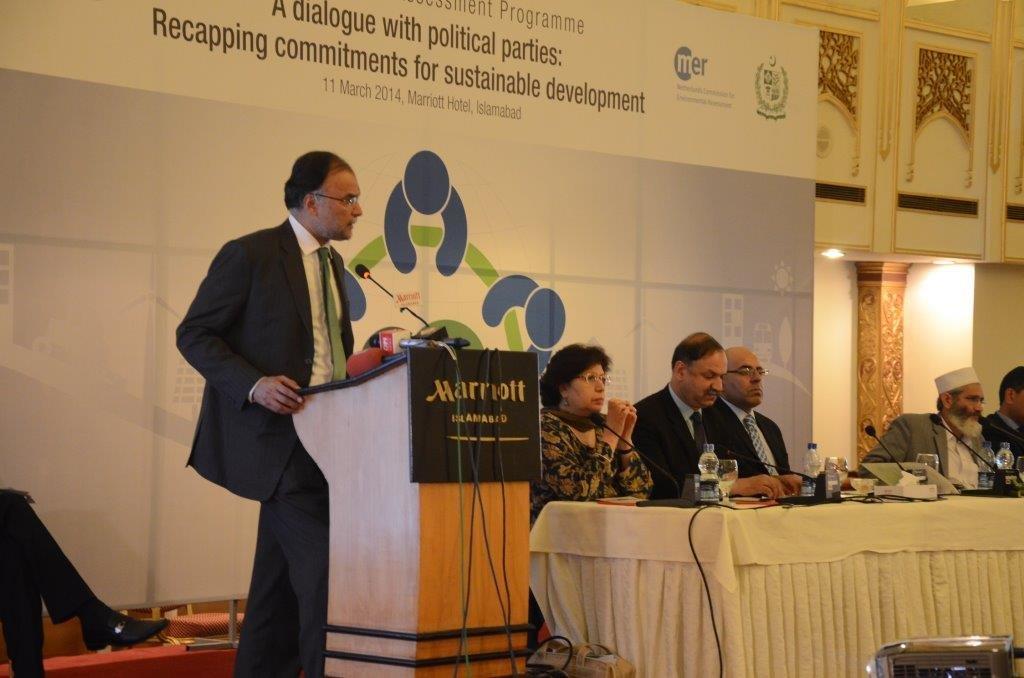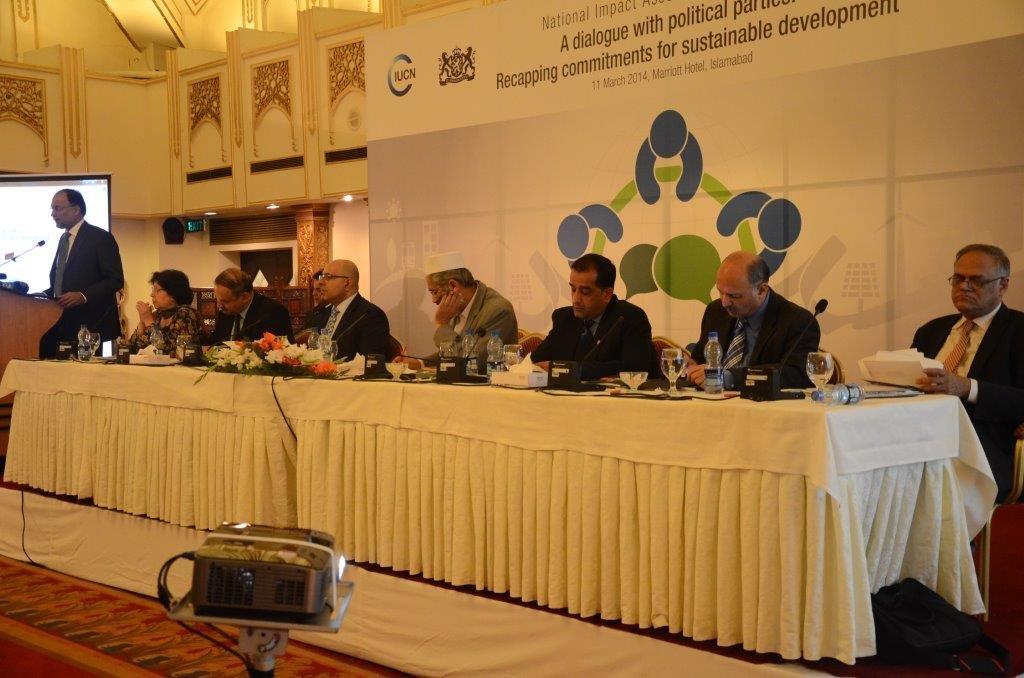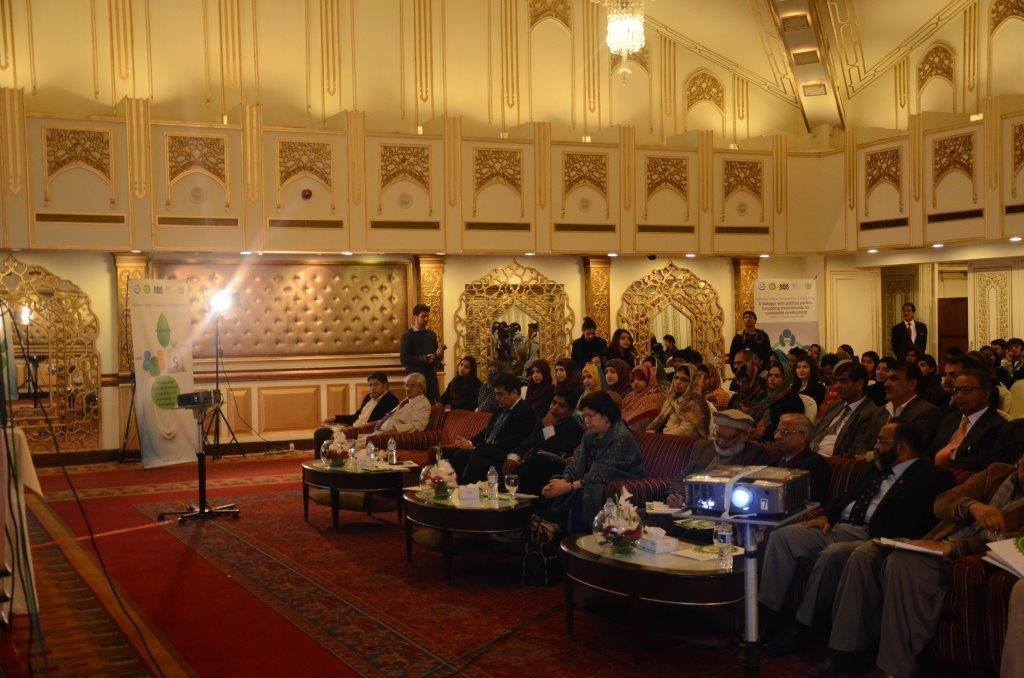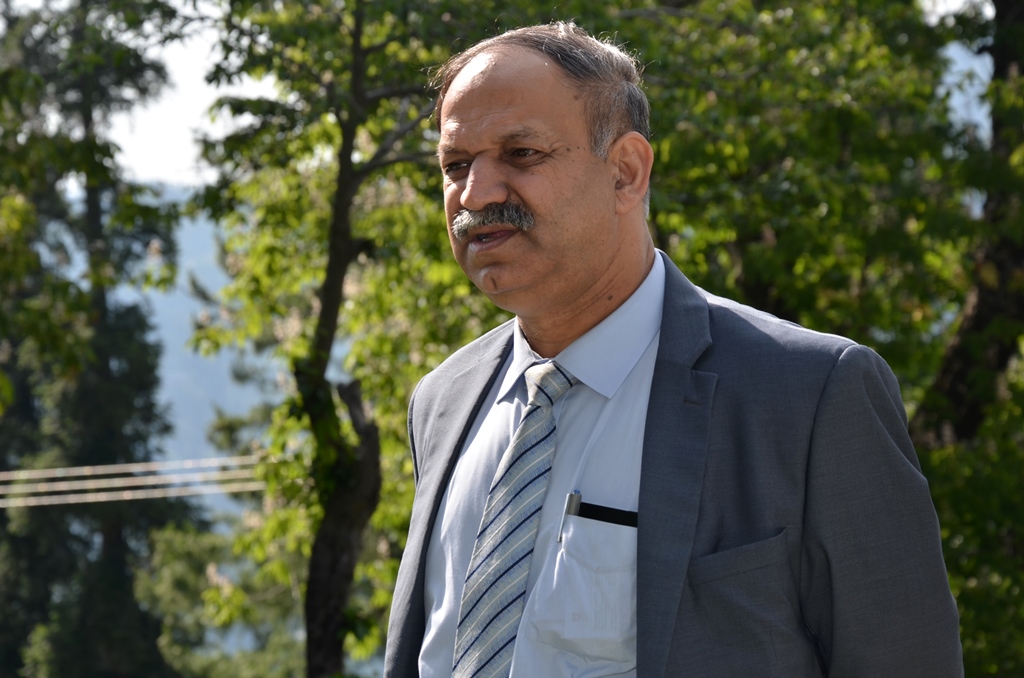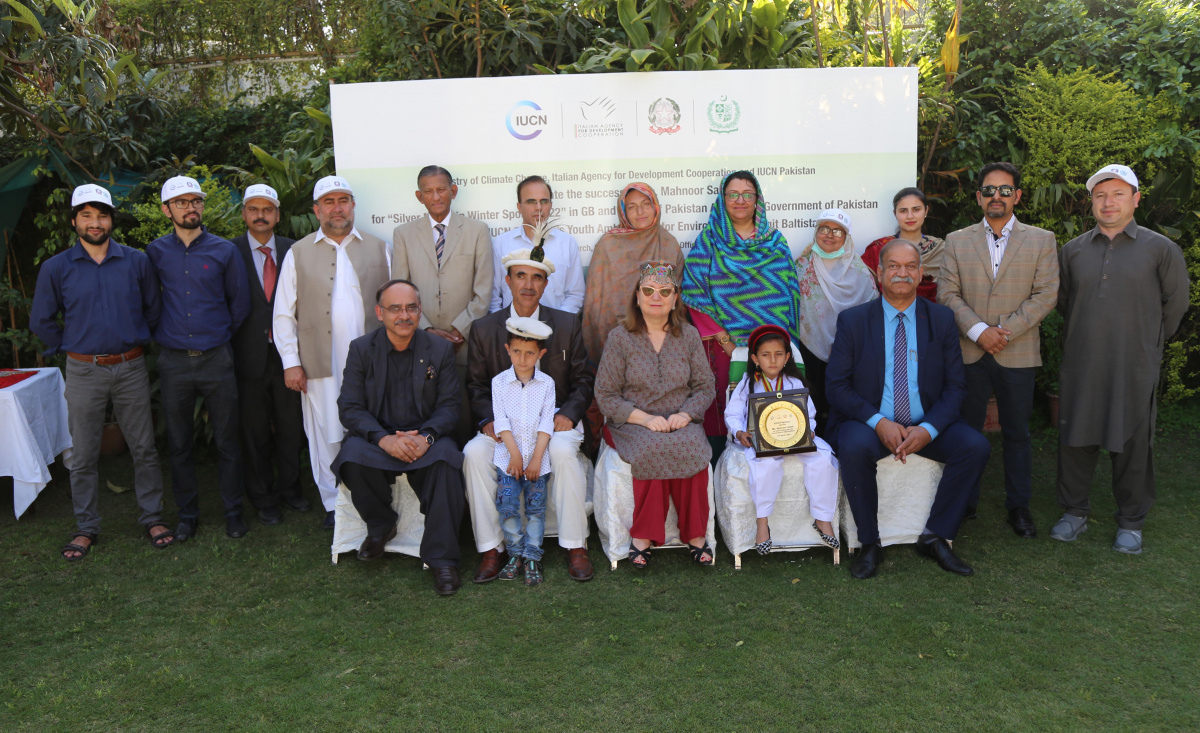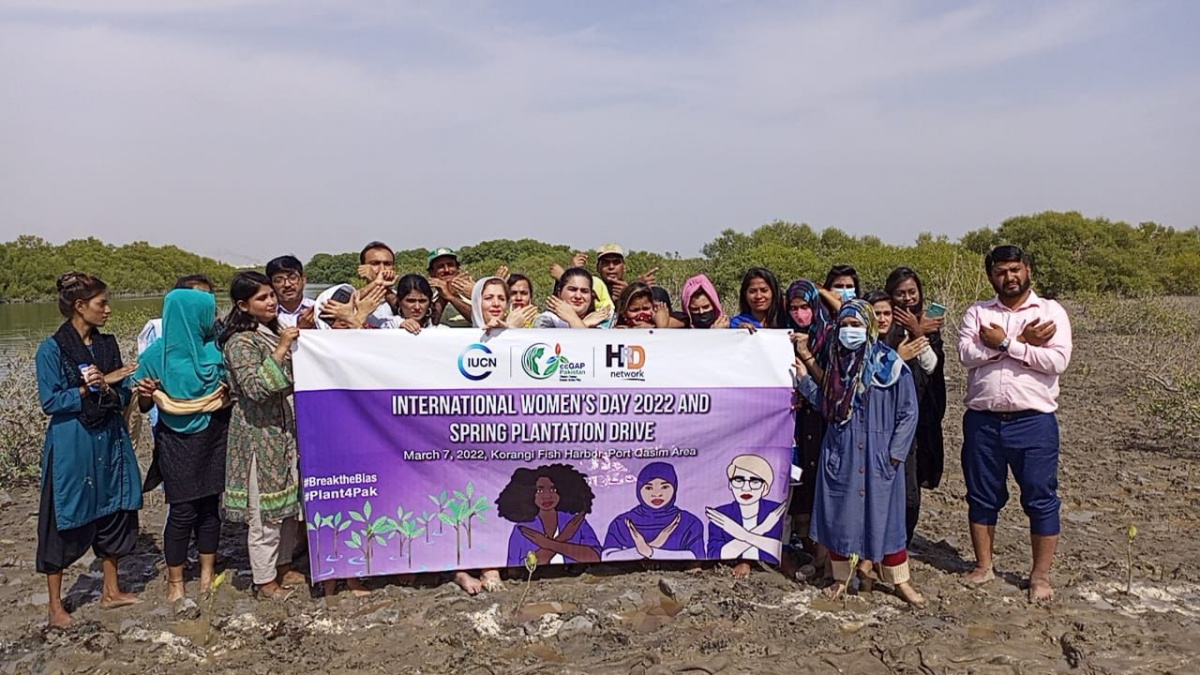A dialogue with political parties of the country: Renewing Political Will towards Sustainable Development in Pakistan
A first-of-its-kind dialogue to debate weightage political parties of Pakistan give to environment in their manifestoes was organized by the Government of Pakistan and IUCN under their joint National Impact Assessment Programme (NIAP) in Islamabad today.
The dialogue titled ‘Recapping commitments for sustainable development – A dialogue with political parties’ brought together sitting federal ministers, distinguished MNAs and leading politicians to elicit their thoughts on and commitments towards environment. Participants at the dialogue included senior government dignitaries, diplomats, civil society representatives, the media, academia and eminent experts.
The National Impact Assessment Programme (NIAP) being jointly implemented by the Government of Pakistan and IUCN aims to contribute to sustainable development in Pakistan by strengthening Environmental Impact Assessment (EIA) and introducing Strategic Environmental Assessment (SEA) in Pakistan’s development planning processes. NIAP has four partners namely: the Pakistan Environmental Protection Agency (PEPA); Environment Wing, Ministry of Climate Change; Environment Section, Planning Commission of Pakistan and IUCN Pakistan. Technical assistance to the programme is being provided by the Netherlands Commission for Environmental Assessment (NCEA) while the project is being funded by the Embassy of the Kingdom of Netherlands (EKN).
The dialogue was an opportunity for renewing political commitment to promoting sustainable development in the country. Moderated by a renowned news analyst and television anchor Syed Talat Hussain, the dialogue aimed at including environment as a priority subject on the election agenda and mainstream political process. Representatives of major political parties sitting on the panel comprised Mr. Ahsan Iqbal, Federal Minister for Planning and Development; Mr.Javed Jabbar, a veteran politician and a media expert; Mr. Malik Amin Aslam from Pakistan Tehrik-e-Insaaf; Mr.Mushahid Hussain Syed from PML (Q); Mr. Qamar Zaman Kaira, (PPP), Mariam Aurangzeb of PML (N); Siraj-ul-Haq (Jamaat-e-Islami), and Mr. Jan Achakzai from Jamiat Ulmai Islam (F).
The proceedings started with a welcome address by IUCN Project Manager on NIAP, Mr. Ahmad Saeed, who said:
Weak environmental governance is a root cause of all environmental problems in Pakistan, indicated by the fact that EIA is not being implemented properly in the planning and development of projects. Also, there is no concept of SEA in policy formulation.
Awareness-raising and capacity building of stakeholders is an important component of NIAP. To improve understanding of SEA and EIA of stakeholders and the public in general, it is critical that all stakeholders are actively involved – specially the policy-makers, civil society, the private sector, academia and the media.
A documentary on environmental impact assessment was also shown. The panelists were then invited to express their views and political commitments towards environment.
In his closing remarks, IUCN Country Representative, Mr. Mahmood Akhtar Cheema, noted:
There is no question that effective and transparent environmental impact assessment processes play an important role in driving sustainable development, and helping to ensure resilience in the face of climate change and other natural disasters.
Environmental Impact Assessment has evolved and become part of major project requirements in many countries – and IUCN is helping to strengthen EIA in Pakistan as well.
Environmental degradation poses risks to livelihoods of the people. It is therefore essential that urgent steps are taken and the collective voice of our political parties on the cause of environment is raised.
In view of the environmental issues being faced by Pakistan, I hope that the debate today will lead to renewed commitment from all major parties that are present today in this dialogue, and that we all understand why sustainable development holds key to an economically viable future for all of us.
The dialogue concluded that in order to influence the decision- and policy-makers into taking the right decisions, it was imperative that environmental issues were well-understood along with implications from a lack of action. It was also felt that the power of the media, especially social media, should be capitalized upon to mobilize larger organizations into action, while all other stakeholders continued to play their respective roles.
About IUCN
IUCN, International Union for Conservation of Nature, helps the world find pragmatic solutions to our most pressing environment and development challenges. IUCN works on biodiversity, climate change, energy, human livelihoods and greening the world economy by supporting scientific research, managing field projects all over the world, and bringing governments, NGOs, the UN and companies together to develop policy, laws and best practice.
IUCN is the world’s oldest and largest global environmental organization, with more than 1,200 government and NGO members and almost 11,000 volunteer experts in some 160 countries. IUCN’s work is supported by over 1,000 staff in 45 offices and hundreds of partners in public, NGO and private sectors around the world. IUCN’s Asia Regional Office is in Bangkok Thailand. The IUCN Asia Regional Secretariat has over 300 staff located in country and liaison offices in Bangladesh, Cambodia, China, India, Lao PDR, Nepal, Pakistan, Sri Lanka, Thailand and Viet Nam.
For more Information, please contact:
Arfa Zaheer Azmat
Deputy Project Manager/ Advocacy Coordinator –NIAP, Islamabad Programme Office
IUCN, International Union for Conservation of Nature
H. No 2, Street 83, Sector G- 6/ 4
Islamabad, PAKISTAN
Tel: +92 51 2271027- 34
Fax: +92 51 2271017
Email: arfa.zaheer@iucn.org
